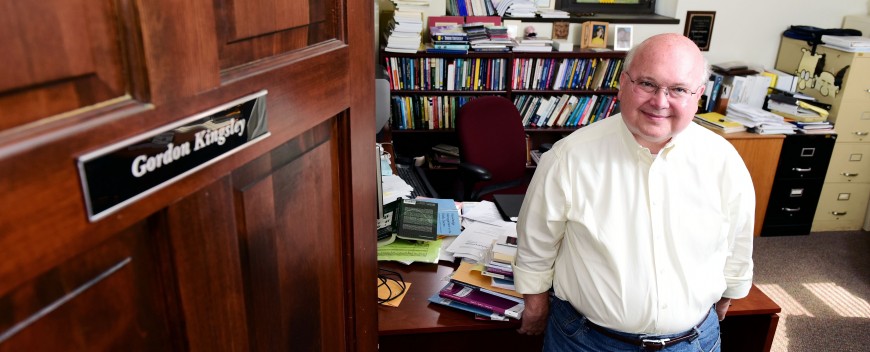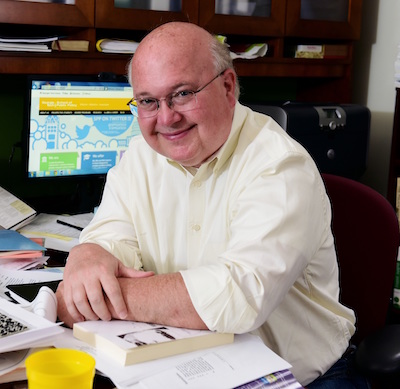
Public-private partnerships build bridges, roads, and many other large-scale public infrastructure projects in Georgia. They also produce another valuable asset — knowledge.
Gordon Kingsley has spent the past few years working with the Georgia Department of Transportation (GDOT) researching ways the department can capture and retain this knowledge.
Outsourcing and privatizing activities formerly performed exclusively by public agencies has been gaining traction across the U.S. since the 1980s, according to Kingsley, an associate professor in the School of Public Policy at Georgia Tech's Ivan Allen College of Liberal Arts.
At its peak during construction of the interstate highways, for example, GDOT employed about 10,000 workers. Now, with much of its work outsourced, the agency's roster has shrunk to around 4,000.
Whether privatization is good or bad isn't at issue, Kingsley notes. ‟That's a political choice that has already been made through a broad consensus as a way of using market forces to gain greater efficiencies in the provision of certain public services.”
In one recently completed research project, Kingsley focused on discovering if and how a community of practice could be formed among GDOT engineers and their private-contractor counterparts. The aim was to determine if knowledge acquired during collaborative construction projects could be retained by the state as an information resource for future work.
Knowledge-Management in a Complex World
Communities of practice, which may be organized formally or informally, typically are formed by people who share a common professional interest and want to develop their expertise by sharing information and learning from each other. They are common among large multinational corporations, but have never before been studied in depth to see if they would work within the context of public-private collaborations.
‟What attracted me to the idea was its engineering component,” Kingsley says. ‟When we think about engineering, we think about precision and the ability of engineers to be able to exercise their professional judgment to the highest levels that they possibly can, whether they are public engineers or someone working in the private sector. Information is key, so the question then becomes, how do we design a knowledge-management system for engineers in this very complex world where you're now relying on an outsourced environment?”
Adopting an experimental approach, Kingsley studied four groups involved in different aspects of the pre-construction design process. He was aided by a research team that included Professor Juan Rogers and Associate Professor Janelle Knox-Hayes, also from the School of Public Policy, and a post-doctoral student, Eric Boyer.
‟The goal was to see if we can foster communities of practice through active engagement and development.”
The interaction between two groups — one concerned with applying geographical information systems to transportation projects, and the other focused on environmental and cultural aspects of such projects — was closely monitored, but no efforts were made to influence or guide them toward sharing knowledge.
The other two engineering groups were concerned with alternative intersection designs and practical design training, respectively. Here, Kingsley and his co-researchers provided a common information technology backbone using shared-point technology. In addition, workshops were conducted about community building and how to retain knowledge within an organization.
When the study concluded in early 2015, the first pair of groups had in fact exhibited some patterns of community-like behavior on their own, but sound communities of practice did not evolve, Kingsley notes.
On the other hand, the second set of engineering groups formed robust communities of practice, with participants sharing best practices, ideas, and perspectives.
‟We found that this type of activity could indeed be fostered,” says Kingsley. ‟It didn't have to be left to the whims of fate.”
Retaining Knowledge for the Future
 Communities of practice are just one component of a much larger knowledge-management strategy, he adds, but they're a useful way to hold on to some of the most valuable knowledge and preserve it for future projects.
Communities of practice are just one component of a much larger knowledge-management strategy, he adds, but they're a useful way to hold on to some of the most valuable knowledge and preserve it for future projects.
Retaining knowledge within GDOT may also mitigate the effects of the so-called "‟silver tsunami,"” the great waves of retirement already underway as baby boomers leave the workforce. This is particularly true at GDOT, where the average age of an engineer is higher than those in private industry.
‟What happens when that knowledge walks out the door as people retire?” he asks. ‟You might hire that person back as a consultant, but that only works for a very short period of time. The agency has to go through a process of thinking through what knowledge it needs to hold on to and what knowledge it's willing to let go.”
Kingsley's research has practical value for his Georgia Tech students as well. When he first joined the School of Public Policy faculty in 1994, most of his graduates found employment in the public sector.
‟These days, and Georgia Tech is not alone in this, maybe a third of your students are going to head off to the public sector, a third are going into the not-for-profit sector, and a third will work in the for-profit sector,” Kingsley says.
‟Bringing these lessons into the classroom means that, instead of just talking about bureaucracy and public budgets, you also have to teach about contracts, knowledge-management systems, and collaboration coordination across the sectors if you're going to produce someone who will be a competent professional in the engineering field.”
About Gordon Kingsley
Associate Professor, School of Public Policy
Gordon Kingsley is director of graduate studies and an associate professor in the School of Public Policy at Georgia Tech. Kingsley teaches classes in public management, business-government relations, policy analysis, and theories of public policy. Kingsley's research examines the development and implementation of effective partnerships across the public, private, and non-profit sectors.
